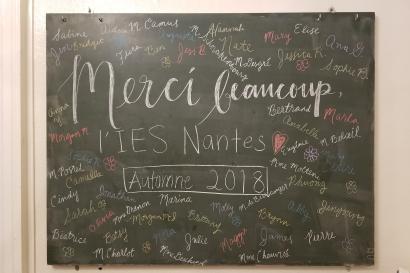Cw: slavery, violence, harassment, race
Before the semester I was worried about sticking out like a sore thumb as a POC in Nantes, but I found that there are a fair amount of POC in Nantes, and I felt pretty comfortable on the whole during my semester abroad. Read on for a some of my jumbled thoughts and reflections from the semester.
On Race
Historically, Nantes was a port during the triangle trade which in turn brought products like rum and sugar, but the ugly side of this was how it enabled and profited from the slave trade. I found that Nantes makes an effort to recognize this with the Memorial to the Abolition of Slavery (Mémorial de l'abolition de l'esclavage) and a part of the Nantes History Museum (Musée d'histoire de Nantes) about the triangle trade. I personally felt uncomfortable with the exhibit at the Nantes History Museum because it had really graphic illustrations of slaves and objects like neck shackles on display, and to me it felt like it just crossed the line of being shocking in an almost sensationalizing way instead of a meaningful one.
On the whole though, I found that how race is discussed in France is different from the conversations about it in the U.S. For example, one of the videos that we watched in our French class this semester about the triangle trade asserted that the slave trade wasn’t racist and existed for economic reasons. This may be a cultural difference, but I feel that perhaps as Americans we tend to be directly address and discuss racial issues more.
On Being an American Abroad
As an American, I found it weird getting used to hearing about the USA and following American news from abroad. I felt frustrated because I was invested in American news but also physically very distant from what was happening. At the same time, there was a surprising amount of coverage about the U.S. on French news and media – the day after the midterm elections, the overall results appeared on the 8 PM news my host family watches. It felt bizarre following the news about an election that I voted in on the news of another country.
Another thing about being American on a language immersion program was that at times I did feel frustrated when I tried to speak French but people would still try to use English with me. I wondered if this had to do with the fact that I also look Asian, but I’ve heard from other white American peers that this happens to them as well. On the flip side though, during my semester there were also moments when I felt extremely grateful for fellow American friends on my program and the ability to chat with them in English. The ability to articulate thoughts without having to consciously choose words to express them was something I really took for granted before the semester.
On Homesickness
I was excited and relieved to find that there are many Asian restaurants, especially in Bouffay. My one food item I cannot live without is noodle soup, so I found myself at Ramen-Ya (for ramen) and Asie Neptune (for pho) a few times this semester.
Because of this, I didn’t really feel super homesick during most of my semester, but homesickness hit me in moments. One of the moments was when I walked by the Asian grocery store right by the Château des ducs de Bretagne. I happened to stumble in because it was one of few places open on Sunday, but I found myself on the verge of tears as I walked through the aisles of assorted instant noodles, mochi snacks, beverages with aloe and the freezers with familiar frozen fish balls. Walking in this one grocery store made me think of the 99 Ranch Markets and H Marts (Taiwanese-American and Korean-American supermarkets) of home.
Something else that I missed about home was boba milk tea. As a college student in SoCal, “getting boba” is a social activity arguably as ubiquitous as going to get coffee. I’m from a city that is not only a college town in SoCal but also has a significant population of Asians and Asian-Americans, and the joke is that you can find a boba place in every shopping center. Therefore, I am still impressed with myself that I managed to not have any boba milk tea for four entire months. (Though, for future Nantes students who can’t wait, according to the TAs, there is a place called So Asian café that may have the milk tea and tapioca balls you are so craving).
On Microaggressions
Of course, there were also some microaggressions during my time in Europe. The most common were people asking questions to the effect of “where are you really from” and random comments in different Asian languages. I remember once I was walking at night in Budapest with another Asian female friend on my program during our fall break travels, and we walked past a café/bar with people seated outside facing the street. Some guy there said “Ohayou” (good morning in Japanese, never mind the fact that neither of us are Japanese) to us as we were just walking by, and it made me feel uncomfortable and prompted me and my friend to walk faster. For the most part though, there were pretty few of these interactions and my experience in Europe was not that much worse in terms of racial microaggressions than it is in the U.S.
To finish off with a funny #lostintranslation moment: one time during dinner in my host family, we were talking about my family and our dinnertime habits. My host mom asked me something like, Est-ce que ta famille mange avec des baguettes ? At the time, I did not know that the word “baguettes” can signify a number of things that are not just bread, so I was understandably confused and responded that no, my family doesn't usually eat baguettes with dinner. To this my host parents laughed and actually pulled out a pair of chopsticks to indicate what they meant and I facepalmed a little at myself.

Brittany Chen
<p>Brittany Chen is a Cognitive Science major and French minor at Pomona College. She enjoys singing in choir, eating dessert, playing board games and card games with friends, learning about linguistics, and making/appreciating puns. She hopes to work in education or become the voice of public transit or commercials in the future.</p>









